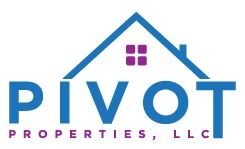
Selling a house is time consuming and expensive — often much more than sellers might expect. When you’re thinking about selling, it’s easy to get excited looking at your Zestimate® home valuation tool and seeing how much your home value may have increased over the years, but it’s important to be prepared for the hidden, and sometimes overlooked, costs of selling a home.
On average, homeowners spend seven months planning and preparing to sell their home, and three additional months with their home listed, pending and closing. Here are the expenses you can expect during that time.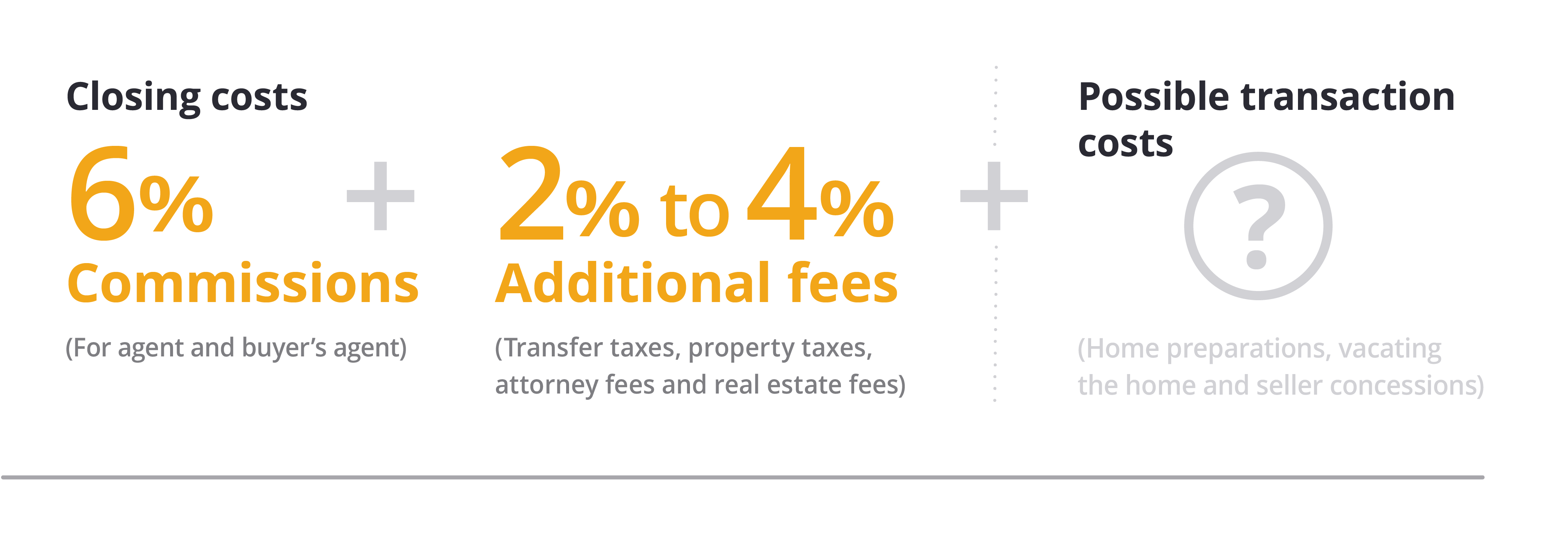
How much does it cost to sell a house?
The overall transaction costs of selling a house include standard closing costs as well as potential charges associated with preparing the home for sale, relocating your belongings (and sometimes yourself), and offering concessions to the buyer.
To clarify, typical closing costs include up to 6% in commissions (to your agent and the buyer’s agent), and an additional 2% to 4% in transfer taxes and property taxes, attorney fees, and real estate fees like title insurance, HOA transfers, and escrow fees.
If you’re just beginning your selling process and are curious about the cash proceeds to invest in your next property, try our home sale proceeds calculator.
Breakdown of home-selling costs
- Home preparations
- Vacating the home
- Seller concessions
- Closing costs for sellers
- Real estate fees: Loan payoff, taxes and penalties
Costs associated with selling a house: Home preparations
While not the typical closing costs, these are some of the contributing costs to sell a house:
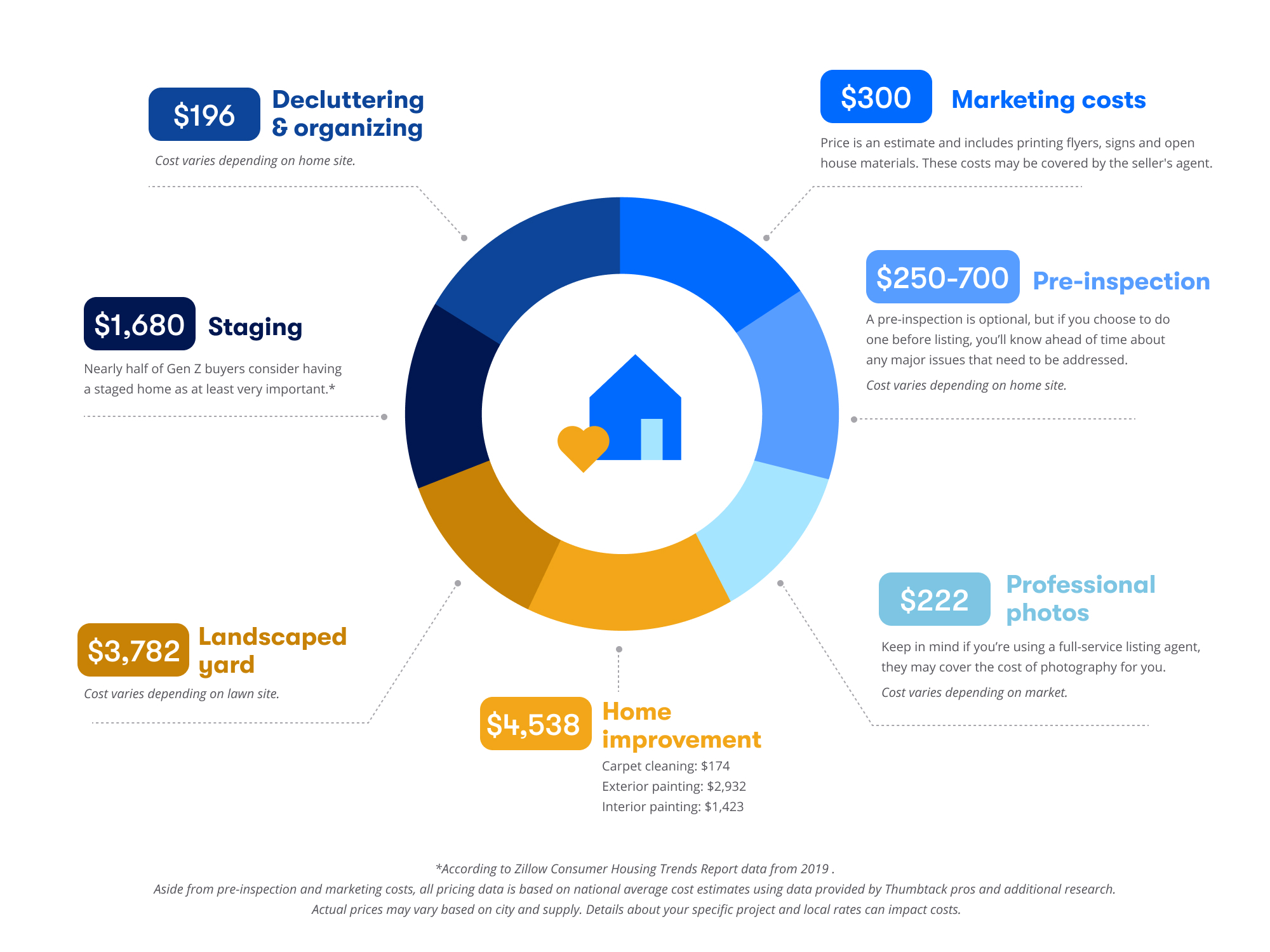
Cleaning: Before your first open house or showing, consider hiring a house cleaner to do a deep clean. You’ll also want to have the carpets professionally cleaned and the windows washed.
Staging: According to 2019 Zillow research, younger buyers are more likely to consider home staging extremely or very important — 48% of Generation Z and 40% of millennial buyers. Home staging can take many forms, but at a minimum, you should declutter, arrange furniture to make the most of the space, and remove personal belongings. Little touches like new bath towels, a fresh doormat, flowers, and cookies can go a long way too.
Landscaping: Your curb appeal is your home’s first impression, so you’ll want to make your exterior look its best. A 2022 Zillow survey found that 33% of sellers who had sold their home in the past two years did landscaping before listing their home for sale and 21% said it helped sell their home. Costs can vary; adding flowering plants, raking any leaves, mowing the lawn, lighting the walkway, and — in winter — shoveling snow might be a few hundred dollars. But larger projects like planting trees or installing a sprinkler system can cost thousands.
Home improvements: There are two main types of home improvements you can do before listing: updates to repair or replace old systems (roof, furnace, windows, etc.), and upgrades that add features buyers love, with a goal of garnering a higher sale price. Ask your agent for their recommendation on what buyers in your specific area are looking for: 65% of sellers take on at least two home improvement projects before selling.
Professional photos and 3D tours: In a Zillow survey of prospective home buyers, 68% either somewhat or completely agreed to the statement that 3D tours would help them get a better feel for the home than static photos. While standard professional photos can cost a few hundred dollars, you may be able to make 3D tours with your own camera phone and the payoff can be huge. If you’re using a full-service listing agent, they may cover the cost for you.
Marketing costs: There are costs associated with listing your home on the local MLS, but it is usually covered by your real estate agent if you’re using one. If you’re selling on your own — called for sale by owner (FSBO) — you can list your house for free on Zillow in most states. If you’re selling on your own, you’ll also want to set aside some money to print flyers, signs and open house materials.
Pre-inspection: A pre-inspection is optional, but if you choose to do one before listing, you’ll know ahead of time about any major issues that need to be addressed, which can save a lot of negotiating with potential buyers down the road. According to the Zillow Consumer Housing Trends Report 2022, 84% of sellers reported that a potential buyer completed an inspection on the home at least once. By paying $250- $700 for an inspection (depending on the size of your home), you’ll have the information you need to choose the right list price and negotiate strategically.
Home selling expenses: Vacating the home
Another type of expense you’ll need to budget for is moving — the costs related to actually vacating your home.
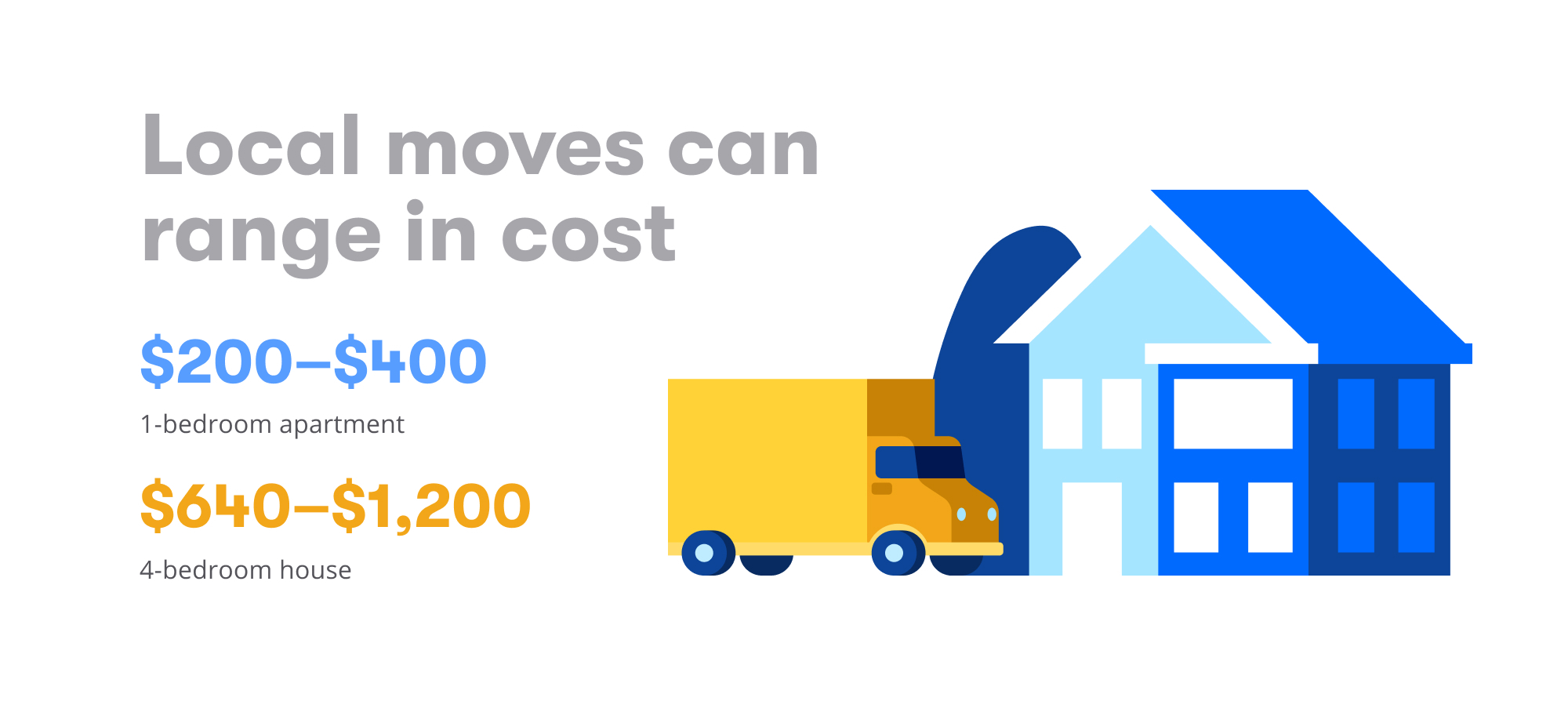
Temporary housing: If you’re selling one home and buying another, it’s almost impossible to time the transactions perfectly so there are no additional housing costs. Regardless of where you’re moving next, most sellers typically have an overlap of about a month and a half when they’re still paying their existing mortgage, plus alternative housing costs.
Utilities: Most sellers leave their utilities on while their house is on the market, for showings and open houses. But be sure to shut off utilities as of the date you vacate so you can avoid unnecessary costs. Your final utility bills should be prorated as of the date of sale.
Moving costs: Moving expenses can vary dramatically based on the size of your home, how many belongings you have, and how far you’re moving. But whether you’re doing a DIY move, using professionals from start to finish, or something in between, there are always expenses associated with moving, and they often have to be paid before closing, so you’ll need cash available.
Homeowners insurance for vacant property: Did you know that your existing homeowners insurance policy may not cover your property when it’s vacant? If your home is going to be vacant for any period of time, it’s important to talk to your agent about adding a rider to cover that period.
Common home seller concessions
It’s rare that you receive the perfect offer and can close without making any concessions to the buyer based on contingencies. Here are a few common ones:
Post-inspection repairs: Rarely does an inspection report come back perfect, so it’s common for buyers to request repairs from sellers. As a result of an inspection report, sellers often either lower the sale price so the buyers can make the repairs themselves, or have the repairs completed as a condition of the deal.
Home warranty for buyer: As a way to sweeten the deal for potential buyers, sellers sometimes cover the cost of a home warranty. Not only can it make your home stand out from others on the market, but it can increase a buyer’s confidence in your property. A one-year home warranty can cost $300-$500, depending on coverage.
Credits toward closing costs: Another concession buyers often request is that the seller cover all or part of the buyer’s closing costs, which effectively minimizes the amount of cash a buyer needs to bring to the closing. For the seller, this cost comes out of the profit you’ll make on the home on closing.
Typical closing costs for sellers
Average closing costs for sellers range from 8% to 10% of the home’s sale price, including both agent commission (about 6% of the sale price) and seller fees (about 2% to 4). With the typical home value in the U.S. at about $330,000 (as of March 2023), that puts the closing costs range at $26,400-$33,000. Of course, these costs vary depending on the tax rate where you live and the value of your home.
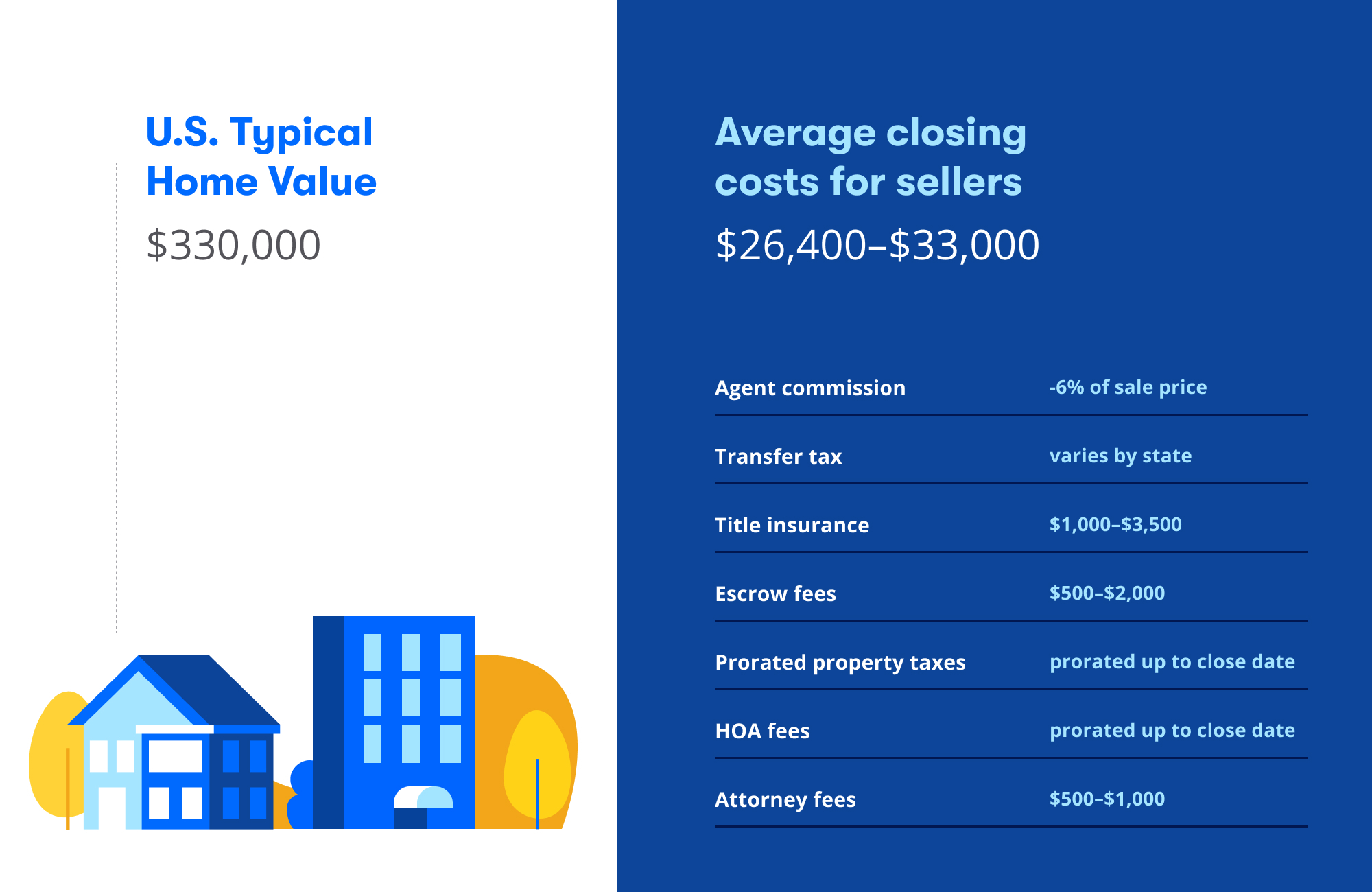 Seller closing costs include:
Seller closing costs include:
Agent commission: The majority of your closing costs come from paying commission to real estate agents. It’s typical that the seller pays both 3% to their own agent and 3% to the buyer’s agent. You can sometimes negotiate down your own agent’s commission, or consider using a discount agent, who offers limited services in exchange for a lower cut.
Transfer tax: Also known as a government transfer tax or title fee, this amount varies widely due to varying tax rates by state and the sale price of the home.
Title insurance: Sellers are also typically required to pay for a title insurance policy for buyers, which protects their interest in the home if there are issues with a disputed title or outstanding liens. Costs typically range between 0.5% and 1% of the sale price, meaning on today’s typical home value, you can expect fees to range between $1,000 and $3,500. This will come out of your net profits on the deal on closing.
Escrow fees: Buyers and sellers typically split the cost of escrow services (the third-party company that handles the disbursement of funds in the sale), which can run $500-$2,000, and can also include extra line items for office expenses, transfer fees, and notary services.
Prorated property taxes: You’re responsible for the property taxes on your home up until the day of closing, so you’ll see a prorated charge on your settlement statement.
HOA fees: Similar to property taxes, if you live in a community with a homeowner’s association, you’ll also be required to pay your dues, prorated up to the close date. There also may be a fee for the transfer of ownership.
Attorney fees: If you use the services of an attorney in your transaction, you’ll have to pay them on closing too. Attorneys are required to oversee closing in these locations: Alabama, Connecticut, Delaware, Florida, Georgia, Kansas, Kentucky, Maine, Maryland, Massachusetts, Mississippi, New Hampshire, New Jersey, New York, North Dakota, Rhode Island, South Carolina, Vermont, Virginia, West Virginia and Washington, D.C.
Real estate fees: Loan payoff, taxes, and penalties
Once the closing costs are settled, it’s not all profit. There are still a few more costs of selling a house that you need to be aware of:
Outstanding mortgage balance: If you’re still paying a mortgage on the home, part of the closing process will include paying off the balance of your mortgage, prorated to the date of sale. You’ll want to check with your mortgage company to see if there is a prepayment penalty as well.
Capital gains tax: Here’s a cost to sell a house that’s often overlooked — until tax time. If you’ve lived in the home for at least two of the last five years, you’ll get a tax break on the profit you make on the sale, up to $250,000 if you’re single or married filing separately, or $500,000 if you’re married, filing jointly. If you think you’re going to be subject to capital gains taxes, either because you’ve profited more than the set amount, or because you’ve lived in the home for less than two years, ask your tax professional about subtracting the costs of preparing the home for sale from your profits.*
*The information provided is intended for informational purposes only, and is not to be relied upon or construed as financial, legal, or other professional advice.
Home sale transaction math
Let’s use a $200,000 home as an example. Say you purchased the home five years ago, putting 10% down (that’s $20,000). Now you’re able to sell the house for $220,000, thanks to appreciation and home improvements you’ve made. Here’s an estimate of what your costs might be:
| Original purchase price | $200,000 |
| 10% down payment | $20,000 |
| Loan amount | $180,000 |
| Current mortgage balance | $165,000 |
Most likely transaction costs
| Home preparations | $5,388 (according to Zillow and Thumbtack; includes common updates like staging, carpet cleaning, and landscaping) |
| Commissions | $13,200 (assuming 6%) |
| Transfer tax | Varies widely by location |
| Prorated property tax | Varies widely by location |
| Utilities | $258 (1.5 months of utilities, based on average monthly utilities from the US Department of Energy) |
| Escrow | $1,000 (seller’s half) |
| Title insurance | $1,000-$3,500 |
| Sum of most likely costs | $20,846-$23,346 |
Possible transaction costs
| Buyer concessions offered during negotiation | $2,200 (1% of the sale price, on average) |
| Optional pre-inspection | $250-700 (depending on the size of the home) |
| HOA fees | $200-$400 (estimated based on paying 1.5 months of dues, plus transfer fee) |
| Attorney fees | $500-$1,500 |
| Temporary housing | $3,000 (1.5 months at the U.S. typical monthly rent of $1,970 a month) |
| Sum of possible costs | $6,150-$7,800 |
Total costs of selling a home
| Sale price | $220,000 |
| Current mortgage balance | -$165,000 |
| Equity (sale price minus loan balance) | = $55,000 |
| Most likely transaction costs | -$20,846-$23,346 |
| Possible transaction costs | -$6,150-$7,800 |
| Net proceeds | $23,854-$28,004 |
| Transaction Costs | 43-51% of equity spent on the transaction |
**This scenario is provided for illustrative purposes only and individual home sale transactions will depend on a variety of factors related to your specific situation and market.
